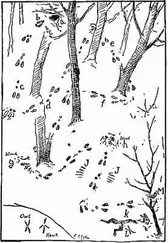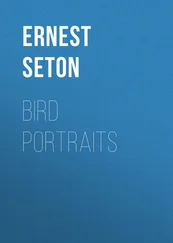Ernest Seton - Rolf in the Woods
Здесь есть возможность читать онлайн «Ernest Seton - Rolf in the Woods» весь текст электронной книги совершенно бесплатно (целиком полную версию без сокращений). В некоторых случаях можно слушать аудио, скачать через торрент в формате fb2 и присутствует краткое содержание. Год выпуска: 1997, Жанр: Приключения про индейцев, Исторические приключения, на английском языке. Описание произведения, (предисловие) а так же отзывы посетителей доступны на портале библиотеки ЛибКат.
- Название:Rolf in the Woods
- Автор:
- Жанр:
- Год:1997
- ISBN:нет данных
- Рейтинг книги:3 / 5. Голосов: 1
-
Избранное:Добавить в избранное
- Отзывы:
-
Ваша оценка:
- 60
- 1
- 2
- 3
- 4
- 5
Rolf in the Woods: краткое содержание, описание и аннотация
Предлагаем к чтению аннотацию, описание, краткое содержание или предисловие (зависит от того, что написал сам автор книги «Rolf in the Woods»). Если вы не нашли необходимую информацию о книге — напишите в комментариях, мы постараемся отыскать её.
Rolf in the Woods — читать онлайн бесплатно полную книгу (весь текст) целиком
Ниже представлен текст книги, разбитый по страницам. Система сохранения места последней прочитанной страницы, позволяет с удобством читать онлайн бесплатно книгу «Rolf in the Woods», без необходимости каждый раз заново искать на чём Вы остановились. Поставьте закладку, и сможете в любой момент перейти на страницу, на которой закончили чтение.
Интервал:
Закладка:
Whenever he could do so, Rolf washed the doubtful dishes over again, yet there were many times when this was impossible, and the situation became very irritating. But he knew that the man who loses his temper has lost the first round of the fight, so, finding the general idea of uncleanness without avail, he sought for some purely Indian argument. As they sat by the evening fire, one day, he led up to talk of his mother—of her power as a medicine woman, of the many evil medicines that harmed her. "It was evil medicine for her if a dog licked her hand or touched her food. A dog licked her hand and the dream dog came to her three days before she died." After a long pause, he added, "In some ways I am like my mother."
Two days later, Rolf chanced to see his friend behind the shanty give Skookum the pan to clean off after they had been frying deer fat. The Indian had no idea that Rolf was near, nor did he ever learn the truth of it.
That night, after midnight, the lad rose quietly, lighted the pine splints that served them for a torch, rubbed some charcoal around each eye to make dark rings that should supply a horror-stricken look. Then he started in to pound on Quonab's tom-tom, singing:
"Evil spirit leave me;
Dog-face do not harm me."
Quonab sat up in amazement. Rolf paid no heed, but went on, bawling and drumming and staring upward into vacant space. After a few minutes Skookum scratched and whined at the shanty door. Rolf rose, took his knife, cut a bunch of hair from Skookum's neck and burned it in the torch, then went on singing with horrid solemnity:
"Evil spirit leave me;
Dog-face do not harm me."
At last he turned, and seeming to discover that Quonab was looking on, said:
"The dream dog came to me. I thought I saw him lick deer grease from the frying pan behind the shanty. He laughed, for he knew that he made evil medicine for me. I am trying to drive him away, so he cannot harm me. I do not know. I am like my mother. She was very wise, but she died after it."
Now Quonab arose, cut some more hair from Skookum, added a pinch of tobacco, then, setting it ablaze, he sang in the rank odour of the burning weed and hair, his strongest song to kill ill magic; and Rolf, as he chuckled and sweetly sank to sleep, knew that the fight was won. His friend would never, never more install Skookum in the high and sacred post of pot-licker, dishwasher, or final polisher.
Chapter 35.
Snaring Rabbits
The deepening snow about the cabin was marked in all the thickets by the multitudinous tracks of the snowshoe rabbits or white hares. Occasionally the hunters saw them, but paid little heed. Why should they look at rabbits when deer were plentiful?
"You catch rabbit?" asked Quonab one day when Rolf was feeling fit again.
"I can shoot one with my bow," was the answer, "but why should I, when we have plenty of deer?"
"My people always hunted rabbits. Sometimes no deer were to be found; then the rabbits were food. Sometimes in the enemy's country it was not safe to hunt, except rabbits, with blunt arrows, and they were food. Sometimes only squaws and children in camp—nothing to eat; no guns; then the rabbits were food."
"Well, see me get one," and Rolf took his bow and arrow. He found many white bunnies, but always in the thickest woods. Again and again he tried, but the tantalizing twigs and branches muffled the bow and turned the arrow. It was hours before he returned with a fluffy snowshoe rabbit.
"That is not our way." Quonab led to the thicket and selecting a place of many tracks he cut a lot of brush and made a hedge across with half a dozen openings. At each of these openings he made a snare of strong cord tied to a long pole, hung on a crotch, and so arranged that a tug at the snare would free the pole which in turn would hoist the snare and the creature in it high in the air.
Next morning they went around and found that four of the snares had each a snow-white rabbit hanging by the neck. As he was handling these, Quonab felt a lump I on the hind leg of one. He carefully cut it open and turned out a curious-looking object about the size of an acorn, flattened, made of flesh and covered with hair, and nearly the shape of a large bean. He gazed at it, and, turning to Rolf, said with intense meaning:
"Ugh! we have found the good hunting. This is the Peeto-wab-oos-once, the little medicine rabbit. Now we have strong medicine in the lodge. You shall see."
He went out to the two remaining snares and passed the medicine rabbit through each. An hour later, when they returned, they found a rabbit taken in the first snare.
"It is ever so," said the Indian. "We can always catch rabbits now. My father had the Peeto-wab-i-ush once, the little medicine deer, and so he never failed in hunting but twice. Then he found that his papoose, Quonab, had stolen his great medicine. He was a very wise papoose. He killed a chipmunk each of those days."
"Hark! what is that?" A faint sound of rustling branches, and some short animal noises in the woods had caught Rolf's ear, and Skookum's, too, for he was off like one whose life is bound up in a great purpose.
"Yap, yap, yap," came the angry sound from Skookum. Who can say that animals have no language? His merry "yip, yip, yip," for partridge up a tree, or his long, hilarious, "Yow, yow, yow," when despite all orders he chased some deer, were totally distinct from the angry "Yap, yap," he gave for the bear up the tree, or the "Grrryapgrryap," with which he voiced his hatred of the porcupine.
But now it was the "Yap, yap," as when he had treed the bears.
"Something up a tree," was the Indian's interpretation, as they followed the sound. Something up a tree! A whole menagerie it seemed to Rolf when they got there. Hanging by the neck in the remaining snare, and limp now, was a young lynx, a kit of the year. In the adjoining tree, with Skookum circling and yapping 'round the base, was a savage old lynx. In the crotch above her was another young one, and still higher was a third, all looking their unutterable disgust at the noisy dog below; the mother, indeed, expressing it in occasional hisses, but none of them daring to come down and face him. The lynx is very good fur and very easy prey. The Indian brought the old one down with a shot; then, as fast as he could reload, the others were added to the bag, and, with the one from the snare, they returned laden to the cabin.
The Indian's eyes shone with a peculiar light. "Ugh! Ugh! My father told me; it is great medicine. You see, now, it does not fail."
Chapter 36.
Something Wrong at the Beaver Traps
Once they had run the trap lines, and their store of furs was increasing finely. They had taken twenty-five beavers and counted on getting two or three each time they went to the ponds. But they got an unpleasant surprise in December, on going to the beaver grounds, to find all the traps empty and unmistakable signs that some man had been there and had gone off with the catch. They followed the dim trail of his snowshoes, half hidden by a recent wind, but night came on with more snow, and all signs were lost.
The thief had not found the line yet, for the haul of marten and mink was good. But this was merely the beginning.
The trapper law of the wilderness is much like all primitive laws; first come has first right, provided he is able to hold it. If a strong rival comes in, the first must fight as best he can. The law justifies him in anything he may do, if he succeeds. The law justifies the second in anything he may do, except murder. That is, the defender may shoot to kill; the offender may not.
But the fact of Quonab's being an Indian and Rolf supposedly one, would turn opinion against them in the Adirondacks, and it was quite likely that the rival considered them trespassers on his grounds, although the fact that he robbed their traps without removing them, and kept out of sight, rather showed the guilty conscience of a self-accused poacher.
Читать дальшеИнтервал:
Закладка:
Похожие книги на «Rolf in the Woods»
Представляем Вашему вниманию похожие книги на «Rolf in the Woods» списком для выбора. Мы отобрали схожую по названию и смыслу литературу в надежде предоставить читателям больше вариантов отыскать новые, интересные, ещё непрочитанные произведения.
Обсуждение, отзывы о книге «Rolf in the Woods» и просто собственные мнения читателей. Оставьте ваши комментарии, напишите, что Вы думаете о произведении, его смысле или главных героях. Укажите что конкретно понравилось, а что нет, и почему Вы так считаете.




